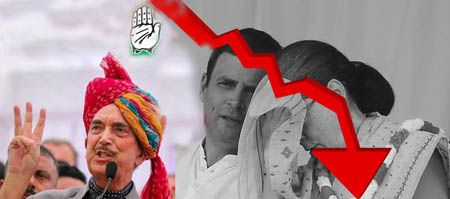“The entire organisational election process is a farce and a sham. At no place, anywhere in the country, have elections been held at any level of the organisation. Handpicked lieutenants of the AICC have been coerced to sign lists prepared by the coterie that runs the AICC, sitting at 24 Akbar Road. At no place in a booth, block, district, or State was an electoral roll published, nominations invited, scrutinised, polling booths set up, and elections held. The AICC leadership is squarely responsible for perpetrating a giant fraud on the party to perpetuate its hold on the ruins of what once was a national movement that fought for and attained the Independence of India” — Shri Ghulam Nabi Azad, in his resignation letter to the Interim Congress President Smt Sonia Gandhi on August 26, 2022
The senior Congress leader Ghulam Nabi Azad’s emotionally charged resignation letter, hurling accusations against Rahul Gandhi about his ‘childish’ behaviour and coterie culture, did not surprise many. The discussion revolved around his declaration of ‘no point of return’ for the Congress. The Congress response is of usual sycophancy and degraded condemnation of the deserted senior party functionary, while other parties naturally question the leadership issue. The party structure is an important pillar of our democracy and, therefore, a few points said and unsaid by Azad about the inevitable decline of ‘Indira Congress’ can provide insights into the political culture evolved in our national polity.
One important factual statement made by Azad in his scathing letter is, “we opposed the Janata Party dispensation and paved the way for the revival and rejuvenation of the party founded by the late Mrs Indira Gandhi in January of 1978”. His acceptance that the formation of the Indira Congress in 1978 was a new beginning, a significant departure from the stated position of claiming the sole legacy over the Independence movement. The allegations of dynastic consolidation, sycophancy, institutionalised corruption and overall degradation of the party organisation etc. are closely associated with the ‘Indira’ part of the Congress. These ills were present in the Nehruvian era Congress also as mentioned in the letters written by Gandhiji immediately after the Independence and the Punjab Assembly deliberations where differing fractions of Congress accusing each other of misappropriating and amassing wealth and property amidst the bloody Partition. The differentiating factor was ‘Organisation’. There were people in the party who could raise their voice and instil some sense of public morality and conduct. Indira era ended that possibility. Most of the problems with the political culture in general and the Congress party, in particular, are rooted in the ‘Indira is India’ mindset. Ironically, Azad didn’t talk about the psyche that originated during the Emergency.
The personality-centric politics is the obvious corollary of the degrading party organisation. The ideological position hardly matters. Congress’s confusion over the proclaimed core principles of socialism and secularism is a classic case to study the unscrupulous nature of politics. All viruses like communalism, casteism, linguistic parochialism, market monopolisation and crony capitalism etc. penetrated democracy. Divisive politics is conveniently used for electoral gains. Invoking the threat of rising Rashtriya Swayamsevak Sangh (RSS) became a bogie in this politics of fraudulent secularism.
Outsourcing ideological articulation to the unaccountable communist, arm-chaired-ideologues was again started during the Indira era. The complete takeover of Congress by the neo-Left by penetrating the Nehru-Gandhi family’s coterie is just a continuation of the same. Even during the Indira, Sanjay, Rajiv and Sonia eras, internal democracy and elections were a ‘farce and sham’ in the Congress. Just that Rahul Gandhi does not have enough skills and organisational strength at his disposal to cover up this façade; hence he tends to expose himself with misfired and ill-timed communication.
Sadly, most political parties, especially the regional ones, imitated the dynastic, corrupt and personality-centric manoeuvrings of the Congress. Some of them have defected from the Congress and effectively learnt the art of manipulating identities to keep control over power.
The crisis of Congress is not just of leadership that is non-serious and disconnected – it is the chronic disease of organisational and ideological character. Ghulam Nabi Azad talked about the momentary symptoms, conveniently bypassing the real ailments. For the political parties to stay relevant in Bharatiya politics, they must learn their lessons from this monumental decline of the Congress party.















Comments